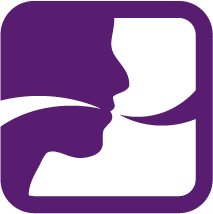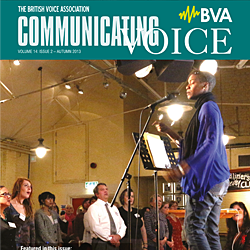About the Association
Archived newsletter articles
Nottingham Voice Days 2007
29th & 30th March, Jubilee Campus, University of Nottingham
British Voice Association event report – by Kathryn Park (Speech and Language Therapist (Voice), Kingston Hospital NHS Trust)
Nottingham Voice Days 2007 were held in part of the university whose architecture and landscaping brought to mind the flatlands and waterways of the Netherlands or the Fens. There were relatively few students about and this added to the sense of being slightly removed and remote from the general hubbub of the city at the end of the working week before Easter.
It felt like a treat to be away from day to day work and to be to be immersed in voice for a while among people with such a wealth of knowledge skills and experience in surgery, teaching, performance and therapy.
For me, a Speech and Language Therapist relatively new to the field of voice and about to take a joint lead role with an ENT Surgeon in a pilot combined voice clinic at our trust, the timing of these days couldn't have been better. I had heard from colleagues that previous Nottingham Voice Days had been excellent so I was expecting the learning experience they offered this year to be valuable and relevant and I wasn't disappointed!
Prior to the course, delegates received the planned programme of presentations and workshops for the two days. Day one focused on an overview of voice disorders and patient assessment in the voice clinic with presentations in the morning and, after lunch, workshops relating to assessment. Day two was about assessment and management of complex voice disorders and in the afternoon, included an interactive case discussion with the expert panel.
We were welcomed at registration in the foyer and had time to say hello fellow delegates before Sue Jones from the Manchester Voice Team opened proceedings in the lecture theatre upstairs by giving an inspiring introduction.
Sue acknowledged the experience present and placed the emphasis of the days on sharing and learning from each other in a combination of theory and practical sessions. The days were also to be an opportunity to recognize the challenges of working in the NHS with current threats to voice clinic services, to discuss concerns and focus on solutions.
Julian McGlashan began with his clear and well-defined presentation entitled "Pragmatic approach to the voice disordered patient". This emphasized the value of the multidisciplinary team in assessing and managing patients with voice disorders as well as the fact that voice disorders are multifactorial with different aetiologies and resulting disorders interacting to create complexity. Good diagnostic tools are essential, as is responding to the patient's symptoms with what works to reduce the symptoms and achieve healthy voice. The pragmatic approach discussed here seemed to set the theme for rest of the course.
Sue Jones talked about the value of voice clinic services and the fact that the "time, equipment and experience" they offer make them a unique and valuable resource. Sue described the model of providing voice services currently used in Manchester and related this to the current political climate. The fact that voice services do not fit into the trend of moving services out of the acute hospital setting was highlighted, as was the fact that we need to keep fighting to win our argument.
Voice clinic services prevent the dangers of inappropriate management such as massive costs and frustrated individuals. Use of outcome measures such as the VOIS is vital, as is being aware of the constant changes occurring in strategic planning as well as the fact that no one voice service is alone in the battle to preserve standards of best practice. The presentation ended with a sense of hope and inspiration rather than despair!
Romain Perouse, ENT Surgeon from France, was fascinating with his talks about structural and mucosal lesions including their presentation and treatment options. His incredibly clear imaging of the lesions and his surgical intervention brought theory into reality and had delegates marveling at how he maintained such a steady surgical hand!
Tom Harris gave a valuable overview and insight into "inflammation" and the need to understand the sequence of what is happening at a chemical and cellular level in the process of tissue damage and healing. "It doesn't take long to form a membrane, it's what goes on underneath that matters"… is a key phrase of Tom's that recall most vividly.
Sara Harris gave an enlightening explanation about what Muscle Imbalance Dysphonia is, and followed this on day two with a joint presentation with Sue Jones about how to work on specific muscle groups in voice therapy.
Meredydd Harrieseducated us with a clear overview of neuromuscular causes of dysphonia as well as a focused consideration of spasmodic dysphonia on day two including presentation diagnosis and treatment options.
Meredydd entertained us on both days by taking us to the Millennium Stadium without the expense - reminding us (several times!) of Wales's victory over England in the Six Nations rugby.
From the workshops the three I chose were the GRBAS, flexible endostroboscopy and rigid endostroboscopy. All were very useful for learning, practicing and discussing skills as well as being fun. Other workshops on offer were objective voice analysis, laryngeal palpation and the role of the singing teacher in the voice clinic. The workshops were run by the presenters as well as other experts in their particular fields including: Katharine Behenna; Declan Costello; Suzanne Slade; Mark Wilson; Adrian Fourcin; Evelyn Abberton; Jacob Lieberman; Lynne Wayman and Alice Poulter.
John Rubin talked about vocal cord palsy, paresis and glottal inefficiency with reference to Ramig's model of classification and different presentations of hypo adduction disorders depending on different levels of damage within the nervous system.
Fiona Robinson followed this an interesting presentation on voice therapy techniques and defined the important distinction between laryngeal function therapy as opposed to just phonation therapy - taking into account respiration, effort closure and swallowing as well as voice in treatment.
Phil Jones Consultant ENT Surgeon in Manchester gave case examples of malignant lesions including their presentation and surgical interventions and highlighted the difference between these and benign lesions.
There was ample opportunity throughout the days to ask questions in a non-threatening and relaxed atmosphere. The exhibitors in the foyer were open to answering queries and having discussions at break times, as well as giving out glossy brochures encouraging us to add to our clinic wish lists!
The hard work that must go on behind the scenes to enable the smooth running of the days obviously paid off and Declan acknowledged the efforts of those involved at the end.
I came away from the course inspired for my work in voice especially in piloting our combined clinic and demonstrating it's worth. My clinical practice is richer for having attended and my patients are directly benefiting. I recommend the Nottingham Voice Days – long may they continue!
Highlights from Nottingham Voice Days - An Osteopath/Singing Teacher's perspective
British Voice Association event report – by Dianne Biberstein
This was my second visit to the Nottingham Voice Days but the venue was new to me as last year the Conference was held at the Post Graduate Medical Centre at Queen's Medical Centre and while the latter is a pleasant building parking there was a nightmare! So it was with a grateful heart that I actually managed to park my vehicle easily and so start Day One stress free.
From the excellent choice of workshops offered during the afternoon session we were invited to choose three. My first was 'Rigid Endostroboscopy' demonstrated by Julian McGlashan and Suzanne Slade. It fascinated me to be able to observe just how individual the larynx is. The rep' said he could do me a good price on the model being used but this was one impulse buy that I resisted!
My second workshop was 'Laryngeal Palpation' conducted by Jacob Liebermann. As an Osteopath I am always keen to observe my colleagues at work and the Osteopathic Treatment of Dysphonia is relatively new to me, it proved to be extremely useful and informative just as I had expected.
My final workshop was 'The Role of the Singing Teacher in the Voice Clinic' taken by Lynne Wayman. I consider myself extremely privileged to be teaching singing after having had a long career in Medicine; my knowledge of anatomy enables me to understand how the voice works and I love watching Lynne because she is so inspiring. Her great enthusiasm when teaching others is infectious. One of her students, Mark, sang for us as she demonstrated her approach to teaching; he had been referred from the Nottingham voice clinic and he talked to us about his own case history and how Lynne had helped him to get his voice back. Later, after having heard him sing, it was hard to imagine that he had ever been struggling as much as he had indicated.
Session One on Day Two was hosted by Mark Wilson. John Rubin was the first speaker of the day, he reminded us of the course of the Vagus, Superior Laryngeal and Recurrent Laryngeal Nerves. This was a trip down memory lane for me – back to the days of my undergraduate anatomy studies. We were advised as to how paresis of the vocal folds can follow disruption of the normal functioning of these nerves which I found fascinating.
Course organised by Sue Jones and Declan Costello in collaboration with The British Voice Association
More archived content online
Disclaimer
Neither the British Voice Association nor the Editor can be held responsible for errors or any consequences arising from the use of information contained in its newsletters (or extracts from its newsletters published online); the views and opinions expressed do not necessarily reflect those of the British Voice Association (BVA) or the Editor, neither does the publication of advertisements constitute any endorsement by the BVA or Editor of any products or services featured.

 Join us Now!
Join us Now! our newsletter
our newsletter free voice care leaflets & information – download here
free voice care leaflets & information – download here Help our work by donating while you shop
Help our work by donating while you shop